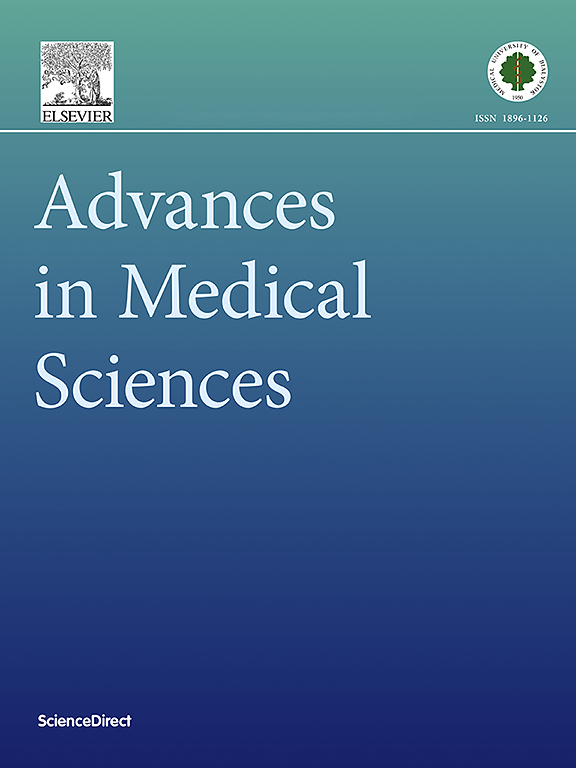Collagen (rs3134646) and ARHGAP15 (rs4662344) genetic variants may predispose to colonic diverticulosis
IF 2.6
4区 医学
Q3 MEDICINE, RESEARCH & EXPERIMENTAL
引用次数: 0
Abstract
Purpose
Colonic diverticulosis is a common condition in older adults in the entire world. Besides environmental factors, there are emerging data on underlying genetic predisposition to diverticula formation. The study aimed to identify genetic factors associated with colonic diverticulosis.
Patients and methods
The study involved 323 patients, 134 with colonic diverticulosis, and 189 healthy controls. In all study participants the following genetic variants were assessed using RT-PCR: rs1800587 in IL1, rs16944, and rs2853550 in IL1B, rs3134646, and rs6434304 in COL3A1, rs3771810, and rs3771863 in TACR1, rs4644560 in NK2R, rs4662344 in ARHGAP15, rs67153654 in FAM155A, and rs7848647 in TNFSF15.
Results
Both, the allele C of the COL3A1 (rs3134646) variant and allele T of the ARHGAP15 (rs4662344) variant, were shown to be associated with diverticulosis, compared to healthy controls in co-dominant and recessive models. Both of them were more frequently reported in patients with colonic diverticulosis, compared to healthy controls.
There were no allelic or genetic associations in patients with diverticulosis or diverticulitis compared to healthy controls, for the following genetic variants: IL1A (rs1800587), IL1B (rs16944, rs2853550), COL3A1 (rs6434304), TACR1 (rs3771810, rs3771863), NK2R (rs4644560), FAM155A (rs67153654) and TNFSF15 (rs7848647).
Conclusions
The allele C of COL3A1 (rs3134646) and allele T of the ARHGAP15 (rs4662344) may predispose to colonic diverticulosis. When viewed in the context of previous studies, these findings suggest that the development of colonic diverticula may be influenced by the involvement and degradation of the extracellular matrix.
胶原蛋白(rs3134646)和ARHGAP15 (rs4662344)基因变异可能易患结肠憩室病
目的:结肠憩室病是世界范围内老年人的常见病。除了环境因素外,关于憩室形成的潜在遗传易感性的数据也在不断涌现。该研究旨在确定与结肠憩室病相关的遗传因素。患者和方法本研究纳入323例患者,134例结肠憩室病,189例健康对照。在所有研究参与者中,使用RT-PCR评估以下遗传变异:IL1中的rs1800587、IL1B中的rs16944和rs2853550、COL3A1中的rs3134646和rs6434304、TACR1中的rs3771810和rs3771863、NK2R中的rs4644560、ARHGAP15中的rs4662344、FAM155A中的rs67153654和TNFSF15中的rs7848647。结果在共显性和隐性模型中,与健康对照相比,COL3A1 (rs3134646)变异的等位基因C和ARHGAP15 (rs4662344)变异的等位基因T都与憩室病有关。与健康对照组相比,这两种情况在结肠憩室病患者中更常见。与健康对照组相比,憩室病或憩室炎患者的以下遗传变异:IL1A (rs1800587)、IL1B (rs16944、rs2853550)、COL3A1 (rs6434304)、TACR1 (rs3771810、rs3771863)、NK2R (rs4644560)、FAM155A (rs67153654)和TNFSF15 (rs7848647)没有等位基因或遗传关联。结论COL3A1等位基因C (rs3134646)和ARHGAP15等位基因T (rs4662344)可能易患结肠憩室病。从以往的研究来看,这些发现表明结肠憩室的发育可能受到细胞外基质的受累和降解的影响。
本文章由计算机程序翻译,如有差异,请以英文原文为准。
求助全文
约1分钟内获得全文
求助全文
来源期刊

Advances in medical sciences
医学-医学:研究与实验
CiteScore
5.00
自引率
0.00%
发文量
53
审稿时长
25 days
期刊介绍:
Advances in Medical Sciences is an international, peer-reviewed journal that welcomes original research articles and reviews on current advances in life sciences, preclinical and clinical medicine, and related disciplines.
The Journal’s primary aim is to make every effort to contribute to progress in medical sciences. The strive is to bridge laboratory and clinical settings with cutting edge research findings and new developments.
Advances in Medical Sciences publishes articles which bring novel insights into diagnostic and molecular imaging, offering essential prior knowledge for diagnosis and treatment indispensable in all areas of medical sciences. It also publishes articles on pathological sciences giving foundation knowledge on the overall study of human diseases. Through its publications Advances in Medical Sciences also stresses the importance of pharmaceutical sciences as a rapidly and ever expanding area of research on drug design, development, action and evaluation contributing significantly to a variety of scientific disciplines.
The journal welcomes submissions from the following disciplines:
General and internal medicine,
Cancer research,
Genetics,
Endocrinology,
Gastroenterology,
Cardiology and Cardiovascular Medicine,
Immunology and Allergy,
Pathology and Forensic Medicine,
Cell and molecular Biology,
Haematology,
Biochemistry,
Clinical and Experimental Pathology.
 求助内容:
求助内容: 应助结果提醒方式:
应助结果提醒方式:


